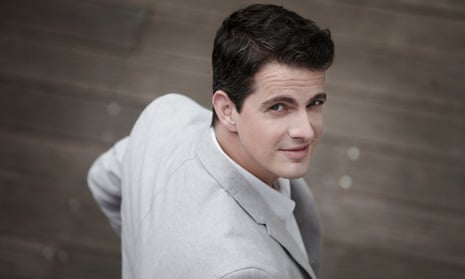Gluck, Mozart opines in Peter Shaffer’s play Amadeus, created characters “so lofty they sound as though they shit marble”. Shaffer’s imagined Mozart is not only potty-mouthed but also harsh on his esteemed predecessor – something the countertenor Philippe Jaroussky confirms on this new recording, singing a very human Orpheus whose story can end only in rejoicing, as Amor obligingly restores Euridice to life in the then-traditional happy ending.
Jaroussky is joined by conductor Diego Fasolis and his ensemble I Barocchisti – almost exactly the same forces as for La Storia d’Orfeo, a lovely disc released last year that spliced together bits of Orpheus operas by Monteverdi, Rossi and Sartorio. Here, again, they are doing something slightly different: this is not the familiar version of Gluck’s work heard in Vienna at the 1762 premiere, but the one performed in Naples 12 years later. For Naples, the opera was tweaked to accommodate a higher-voiced Orfeo and to appeal to a fashionable Italian audience, who expected more contrast and more in the way of florid, yet mellifluous, vocal display.
The most noticeable changes comes in the music for Euridice. Two of her numbers are new, attributed not to Gluck, but to Egidio Lasnel (pen name of the aristocrat Diego Naselli): the duet as Orfeo leads her towards the edge of the Underworld, in which the short exchanges give the music an almost Mozartian sense of bustle, and her ensuing aria, in which her passion now sounds a bit more marmoreal, for all the expressiveness Amanda Forsythe throws at it. Forsythe, her soprano bright yet soft-grained, contrasts well with Emöke Baráth, whose crisp, knowing Amor makes the prospect of a journey through the Underworld sound almost fun. Fasolis and his players wear the music lightly. As for Jaroussky, his sound isn’t always entirely beautiful, but it’s beguiling, and every syllable means something.
This week’s other picks
When Monteverdi wrote the first Orpheus opera, with the art form itself in its infancy, he started with a Prologue, in which a soprano personifying Music explained helpfully that everything would be sung, not spoken. This became a fixture of 17th-century opera – and Francesca Aspromonte’s new disc on Pentatone, Prologue, finds this sparkling young Italian soprano tackling 11 such opening scenes by Italian composers including Cavalli, Cesti and Caccini, accompanied by Il Pomo d’Oro, under the direction of Enrico Onofri. The material is somewhat limiting – all those beginnings and no endings – but it gives her more scope than one might think.

Comments (…)
Sign in or create your Guardian account to join the discussion